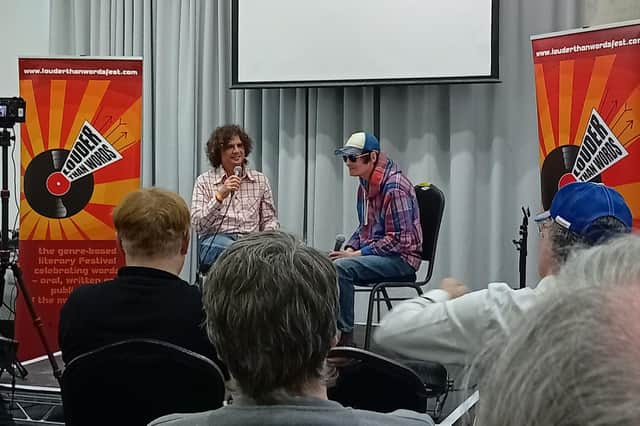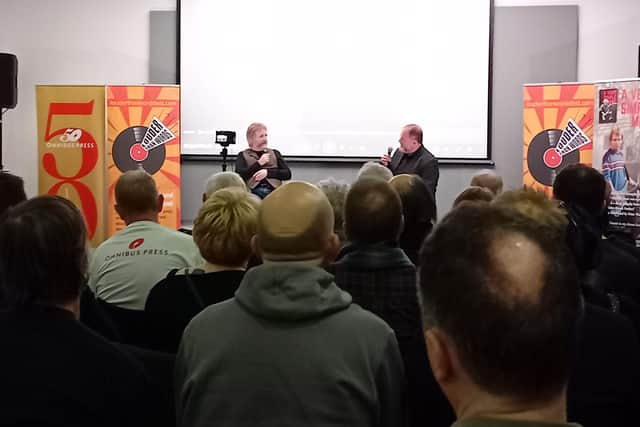Review: Louder Than Words festival at Innside hotel, Manchester


Jill Adam, co-founder of Louder Than Words festival, was in reflective mood as she introduced Saturday’s line-up at Louder Than Words festival.
For any literary event to be entering into its second decade in such straitened times for the arts is a feat, but for one specifically dedicated to writing about music to be fielding one of its strongest-ever line-ups in its 11th year is, she felt, something worth celebrating.
Advertisement
Hide AdAdvertisement
Hide AdThe night before, Adam, the former chairman of Harrogate International Festivals and one-time associate dean of Leeds Metropolitan University, and her fellow co-founder John Robb, the musician and writer, had welcomed the likes of record producer Trevor Horn, Don Powell of Slade, Steve Norman of Spandau Ballet, Bob Stanley of Saint Etienne and Horace Panter of The Specials to Innside hotel in Manchester.


Other famous names still to come over the weekend included Ian Broudie of The Lightning Seeds, Eddie Piller, founder of Acid Jazz Records, Pauline Murray of the punk band Penetration, Nick Banks of Pulp and former Sex Pistol Glen Matlock.
Our Saturday began with a highly entertaining conversation between the singer-songwriter Lawrence, the much-loved voice of cult bands Felt, Denim and Go-Kart Mozart, and The Times journalist Will Hogkinson discussing the latter’s book In Perfect Harmony: Singalong Pop in ’70s Britain. A 500-page tome that, in Hodgkinson’s words, takes “a serious look at the silliest music ever made”, it starts with Clive Dunn’s chart-topper Grandad and ends with the St Winifred’s School Choir number one (There’s No On Quite Like) Grandma, and in between attempts to analyse why so many of the mainstream hits of the decade were jolly and nostalgic while Britain’s economy was falling apart and the world faced dire warnings of looming ecological catastrophe. “I thought there’s got to be some correlation between this stuff,” Hogkinson said.
Lawrence said he was interested in “the backroom boys” like John Carter, the Birmingham-born songwriter whose production line of hits included Beach Baby. Hodgkinson mentioned Tony Macauley, who composed Baby Now That I’ve Found You for The Foundations, and “started to think what if you got rid of the band and it was just session musicians”, duly creating Edison Lighthouse. Another, he recalled, was Tony Burrows who was so prolific he once spent an episode of Top of the Pops running from stage to stage adopting different disguises while performing with all his pretend groups.
Advertisement
Hide AdAdvertisement
Hide Ad“It was the same time as processed food,” Hodgkinson said, remembering the robots in the Smash commercial. “That was kind of the approach – processed music was good.”
Future members of 10CC turned Strawberry Studios in Stockport into a British wing of the Kasenetz-Katz New York bubblegum factory while The New Seekers made considerable capital out of I’d Like To Teach the World to Sing, which was originally written for a Coco-Cola advert and was “an attempt to capture the peace and love era for squares”. Hodgkinson also talked about interviewing Mike Batt, who had tried to have a career as a progressive rock musician before realising he could have hit after hit dressed as a Womble, and Tina Charles, who made a decent living in cabaret and as a session singer on the Top of the Pops covers albums, before having a number one with her “suburban disco” single I Love To Love.
The author explained that his book had been inspired by Lawrence, whose band Denim were “the first to look at the 70s through a different lens”. For his part, Lawrence admitted that he’d always tried to write a song “as good as Grandad but never quite got there”. His quest to “bring in a serious lyrical quality” to an “amazing tune” continues.
Meanwhile, the absence of fanzine editor Tom Vague, due to a bereavement, inevitably hung over the conversation between former NME journalist turned author Richard Cabut and publisher Pete Webb, whose company PC-Press has just brought out a collection of the first 15 issues of his Vague fanzine.
Advertisement
Hide AdAdvertisement
Hide AdBut the pair did their best to explain the cultural significance of his work, which began as a vehicle to enthuse over Adam and the Ants when they were a bondage-wearing punk band and what they meant to the people who followed them, then gradually became more interested in documenting the Stop The City 80s leftist anarchist collective and various countercultural movements.
Cabut, who shared a squat with Tom Vague on the New North Road in London in the early 80s, remembered once writing in the NME that Vague fanzine was a “big pub anecdote in print”, admiring its chatty style. “I wish I had the wherewithal at the time to add that Vague stood out from all the other fanzines because of that style,” he said. “Tom put himself at the centre of his story and he turned Vague and punk rock into a story.”
Vague’s cut-and-paste visual style would come to influence graphic designers at magazines such as The Face, Webb noted, while its editor became a “DIY activist constantly writing and thinking about the changes areas around him” in Notting Hill and Ladbroke Grove. “What Tom represents is the spirit of DIY adventurism,” Webb said, while Cabut added: “Tom kept on moving within himself, he did his own journey. I would like to think we are all still doing the same thing.”
Former Simple Minds bassist Derek Forbes’ discussion with Joel McIver about his memoir A Very Simple Mind had its moments, with recollections of breaking a toe kicking drummer Mel Gaynor up the backside, falling through a skylight at Rockfield Studio during hi-jinks with a “special friend” and a member of the Teardrop Explodes wielding a fire extinguisher, his close friendship with Kirsty MacColl, and the seven years he spent as a member of the synth pop group Propaganda.
Advertisement
Hide AdAdvertisement
Hide AdHe also opened up on his sacking from Simple Minds in 1984, saying: “I had my Yoko Ono moment, I took my girlfriend everywhere; Jim Kerr and the whole band did not like that...I was just getting a wee bit too rock star-ish when I should not have.”
Forbes did rejoin the band in 1995 for their Néapolis album, but it didn’t last. Today he has his own outfit, Derek Forbes and The Dark, who will be touring the UK in December.
Our day ended with Echo and the Bunnymen guitarist Will Sergeant’s lively and droll chat with John Robb about his second volume of memoir, Echoes. Sergeant reminisced about the Bunnymen’s late drummer Pete De Freitas, who ditched plans to go to Oxford University to join the band in 1979. “I’m sure his parents were cheesed off when he said he was going to hang around a squat in Liverpool with all these ne’er-do-wells,” he said.
Sergeant said songwriting in those days was a series of “lucky accidents”, adding: “I certainly didn’t know what I was doing – and nor did Les (Pattinson, the band’s bassist).”
Advertisement
Hide AdAdvertisement
Hide AdHe also admitted he only belatedly discovered the music of The 13th Floor Elevators after the song Simple Things on the B-side of Rescue was compared to the US band; afterward he became a “psychedelic warrior”.
Looking back to his youthful days, the 65-year-old said it “felt special that you were in a band – all of a sudden you were getting into Eric’s (the Liverpool punk nightclub) free, it was a nice feeling from somebody who was a complete nobody”.
All in all, this proved another brilliant and thought-provoking day out at what has become an essential event for lovers of music of all genres. Roll on Louder Than Words’ 12th edition.
